Russian grammar - Gender and adjectives |
|||
|
|||
All Russian nouns (things) have a gender. Russian has 3 genders: masculine, feminine, and neuter. • Most masculine nouns end in a consonant, «-й» or the soft sign «-ь» • Most feminine nouns end in «-а» or «-я». And occasionally with the soft sign «-ь». • Most neuter nouns end in «-о» or «-е». The form of the adjective must agree the gender of the noun it modifies. • Typically a masculine adjective ends in «-ый» or «-ой» • Typically a feminine adjective ends in «-ая» • Typically a neuter adjective ends in «-ое» |
| Examples: | |
|
Новый учитель.
A new teacher.
|
|
|
Большой дом.
A big house.
|
|
|
Старая учительница.
An old (female) teacher.
|
|
|
Красное яблоко.
A red apple.
|
|
|
Интересный музей.
An interesting museum.
|
|
|
Первый ребёнок.
The first child.
|
|
|
Известный актер.
A famous actor.
|
|
|
Известная актриса.
A famous actress.
|
|
|
Закрытая дверь.
Closed door.
|
|
|
Открытое окно.
An open window.
|
|
|
Первый снег.
The first snow.
|
|
|
Первая любовь.
The first love.
|
|
|
Белое облако.
A white cloud.
|
|
|
Красивая лилия.
A beautiful lily.
|
|
|
Популярное кафе.
A popular café.
|
|
|
Разве это не красивый дом?
Isn't that a beautiful house?
|
|
|
Она красивая девушка.
She is a beautiful girl
|
|
|
Это красивое платье.
That is a beautiful dress
|
|
|
Это красивая девушка.
This is a beautiful girl.
|
|
|
Это сильный мужчина.
This is a strong man.
|
|
|
Молодой человек там.
The young man is there.
|
|
 |
|




